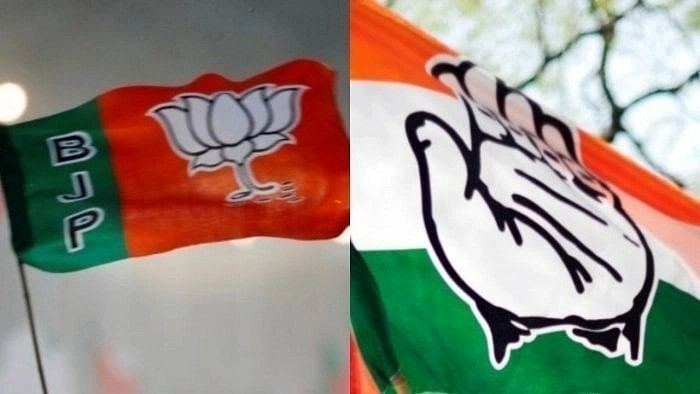
The flags of the BJP (L) and the Congress (R).
Credit: DH File Photo
Jaipur: With the Lok Sabha elections round the corner, the tripartite MoU signed over the Eastern Rajasthan Canal Project (ERCP) is likely to set the political narrative in eastern Rajasthan as both the BJP and the Congress claim credit for bringing water to the water-starved regions.
The BJP had initiated the ERCP project in the state budget 2017-18 during Vasundhara Raje’s tenure for a permanent solution to the problem of drinking and irrigation water in the state.
The ECRP aims to bring water to 13 districts of Rajasthan, by harvesting surplus water available during the rains in rivers in southern Rajasthan such as Chambal and its tributaries like Kannu, Parvati and Kalisindh. The 13 districts to benefit are Ajmer, Alwar, Baran, Bharatpur, Bundi, Dausa, Dholpur, Kota, Karauli, Jaipur, Jhalawar, Sawai Madhopur and Tonk.
Through the help of diversion structures, inter-basin water transfers, linking channels, and construction of pumping main feeder channels, the ECRP aims to create a network of water channels which will cover 23.67 per cent of Rajasthan’s area along with 41.13 per cent of its population.
Some of these districts, like Jaipur, Dausa, Dholpur, Karauli, Bharatpur, and Tonk, are set to vote on April 19 in the first phase of the upcoming general elections. The rest of the affected districts vote on April 26.
Even as former Chief Minister Ashok Gehlot had pushed for the ERCP to be accorded a national project status, the Congress had made it into an election issue before the Assembly polls, claiming the state government had allotted Rs 25,000 crore for it while the Central govt had done nothing for the project. The Congress had even taken out a five-day ERCP yatra before the elections to demand a national status for the project.
However, the Centre did not comply with the demands then and the Minister of State for Jal Shakti, Bishweswar Tudu, had stated as much in the Rajya Sabha on July 23 last year: "[The] ERCP could not be considered for funding under the national projects scheme," Tudu had said, adding that the project “is planned on 50 per cent dependable yield against the established norm of 75 per cent … Thus, [the] ERCP does not fulfil the criteria laid down for inclusion under the National Projects scheme of this Ministry.”
In 2018, of the 83 Assembly seats in the 13 districts affected by the ERCP, the Congress had won 49 while the BJP had won 25 seats. In the 2023 Assembly elections, BJP made substantial gains in eastern Rajasthan compared to last time as the ERCP issue gained traction.
To fulfil its poll promise over the ERCP and keep the issue alive, soon after the BJP government assumed power in December 2023, an MoU was signed in January-end this year by Rajasthan and Madhya Pradesh with the Union Ministry of Jal Shakti, as the Modified Parbati-Kalisindh-Chambal-ERCP (Modified PKC-ERCP) Link project.
The project envisages integration of the original PKC river link project with the ERCP to implement it as an inter-state river linking project. Under the tripartite MoU, this link project, valued at over Rs 45,000 crore, envisages irrigating a total area of 5.60 lakh hectares in Madhya Pradesh and Rajasthan, as well as providing water for drinking and industrial use in 13 districts of eastern Rajasthan and 13 districts of the Malwa and Chambal region of Madhya Pradesh. It will also involve the construction of dams, canals and drinking water projects.
The BJP, while trumpeting its double-engine sarkar benefits, which they claim speeded up the signing up of the agreement, also wants to showcase the project as a shining example of cooperative federalism. The MP government is said to have withdrawn its petition on Parvati-Kalisindh-Chambal link project from the Supreme Court to facilitate this MoU.
Jal Shakti minister Gajendra Singh Shekhawat has urged both Rajasthan and Madhya Pradesh to finalise the Detailed Project Report (DPR) of various components as soon as possible to start work on the project.
Gajendra Singh claimed that with the new DPR, over 2,500 million cubic metres of water would be available for irrigation and drinking—about five times more than the previous projections—in the next 30 years. Under the project, the Centre would provide 90 per cent of the cost and both the MP and Rajasthan government will contribute Rs 4,000 crore each.
However, the Opposition Congress says the BJP is not making the details of the MoU public as it has compromised on the interests of Rajasthan and says there is no clarity on the amount of water Rajasthan would receive.
Gehlot has accused the BJP government of creating confusion over the ERCP and cheating the people of the state while protecting the interests of Madhya Pradesh.
Congress leader Sachin Pilot has also expressed apprehensions over the benefits promised to the state and has called for protecting the interests of Rajasthan.
While demanding the tabling of the MoU in the Assembly, Opposition leader Tika Ram Jully had asked whether this project was 50 per cent or 75 per cent water-dependent as only 50 per cent water availability would mean that it is just a drinking water scheme.
Criticising the BJP for not giving credit to Raje, during whose time the ERCP was conceived, Congress state president Govind Singh Dotasra has said that the Centre had deliberately refused to take the project further during the Congress tenure and due to this delay, now an additional Rs 8,000 crore would have to be spent.